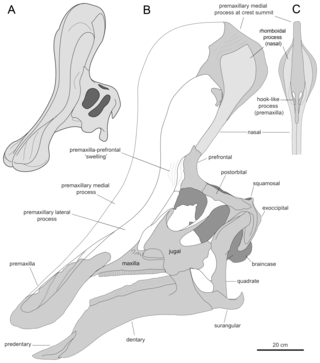Tsintaosaurini
De Wikipédia, l'encyclopédie libre
Les Tsintaosaurini forment une petite tribu fossile de lambéosaurinés basaux, hadrosauridés d'Eurasie, ayant vécu à la fin du Crétacé supérieur (Campanien et Maastrichtien)[2].
Tsinatosaurini
Vision moderne (post-2013) de la tête d'un Tsintaosaurini du genre Tsintaosaurus[1].
Liste des genres
Ce petit clade ne contient que deux genres :
- Tsintaosaurus Young, 1958 - découvert dans la province de Shandong dans l'Est de la Chine ;
- Pararhabdodon Casanovas, Santafé-Llopis & Isidro-Llorens, 1993 - découvert dans le Nord de l'Espagne et le Sud de la France[3],[4].
Le genre Koutalisaurus, découvert dans les mêmes niveaux stratigraphiques de la fin du Crétacé en Espagne, est parfois considéré comme un Tsintaosaurini en raison de cette association. Ce pourrait être un Pararhabdodon[5],[6],[7] ou rester un lambéosauriné indéterminé[2].
Classification
Résumé
Contexte
Cladogramme
Le cladogramme suivant a été réalisé par Albert Prieto-Márquez et ses collègues en 2013, il montre la phylogénie des lambéosaurinés[2] :
| Lambeosaurinae |
| ||||||||||||||||||||||||||||||||||||||||||||||||||||||||||||||||||||||||||||||||||||||||||||||||||||||||||||||||||||||||
Un cladogramme plus large, plus complet et plus récent, établi par les mêmes auteurs en 2016, se trouve dans l'article Hadrosauridae[8].
Notes et références
Voir aussi
Wikiwand - on
Seamless Wikipedia browsing. On steroids.

